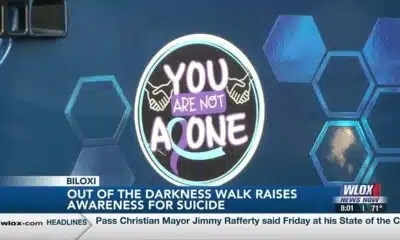Mississippi News
Lost in the shuffle: Chronically ill people suffer as Mississippi politicians quibble over medical marijuana
Lost in the shuffle: Chronically ill people suffer as Mississippi politicians quibble over medical marijuana
As politicians haggle over grams and taxes, THC levels and canopy space, license fees and excises, thousands of chronically ill Mississippi patients and families who believed they would have access to medical marijuana months ago per the will of the voters feel lost in the shuffle.
The Legislature failed to approve a medical marijuana program for years, despite a groundswell to do so, so voters took matters in hand.
The state Supreme Court shot down an overwhelming vote of the people on a technicality.
Gov. Tate Reeves and lawmakers promised to fix this post-haste. They got to arguing and didn’t.
Meanwhile, pain, nausea, seizures and pharmaceutical side effects don’t abate for the sickest of the sick in Mississippi.
Allison Pipkin has dealt with severe pain and nausea and “taken every kind of medicine you can take” since she was 11 and misdiagnosed with ulcerative colitis.
At age 14, Pipkin of DeSoto County was diagnosed with Crohn’s disease and had her colon removed. The surgery was expected to take six hours, but it took 12 because Pipkin’s colon had fused to other organs. She had to have a colostomy bag for three months until another surgery.

Now 24, Pipkin describes a long arduous journey through numerous surgeries and pharmaceutical medicines — steroids, biologics, opioids, pain pumps and even methadone — and their side effects. She had to get special permission to start taking one drug years ago because of her age. Two medicines she takes now carry warnings not to combine them; one costs thousands of dollars a week without insurance. But she does because they’ve been keeping her disease in remission. She no longer takes narcotic pain medicine.
Pipkin has researched and seen reports of cannabis helping Crohn’s patients. She tried black-market marijuana in high school and it helped her chronic nausea and pain. She won’t use it now for fear of losing insurance, and because it’s illegal in Mississippi.
“It helped with the symptoms, even if it’s not a cure-all,” Pipkin said. “It’s better than narcotics. I don’t understand how they can prescribe a 14-year-old all these drugs … but can’t prescribe a plant that’s non-addictive.
“I feel like (politicians) don’t have any empathy for humanity at all,” Pipkin said. “If I was governing people, I would want them to be their happiest and healthiest to help society.”
Pipkin wants to continue her college education. She’s considering taking a scholarship offer from Arkansas State University. Arkansas voters legalized medical marijuana in 2016.
Shane Polk’s years of service in the 82nd Airborne, including a tour during Desert Storm, took a toll on his body.
He suffered two traumatic brain injuries, crushed vertebrae, and numerous other injuries jumping from planes and blowing things up and has to think for a bit to count up all the surgeries he’s had. And for the last 25 years his life “has revolved around seizures.”
Polk, 52, of Biloxi suffers grand mal seizures and dryly notes, “One wrong seizure for me, and I’m dead.” He’s also had two mini-strokes and suffers from migraine headaches.
At one point, Polk was having 20 to 30 seizures a week, sometimes three or four on a bad day. He was taking multiple medications a day and they didn’t appear to be helping. He quit taking opioids because “it got to where it didn’t help” and he didn’t want to become addicted.

Polk said he was feeling “over-medicated” and miserable, taking handfuls of prescriptions a day about four years ago when he heard on television that cannabis can help seizures and other ailments. He had a friend in Colorado — which had legalized both medical and recreational marijuana — and he went for an extended visit.
“I tried cannabis, and it worked,” Polk said.
Polk is off most of the medications he was taking, his seizures are down to one every four or five months and his pain is reduced.
“It’s not a cure-all, but I’d say I’m 80% better,” Polk said. “I’m doing all right for the shape I’m in.”
But Polk has to resort to the black market for marijuana in Mississippi.
“I don’t want to and I shouldn’t have to,” Polk said. “It’s almost embarrassing — you want to hide that you use it. It’s a risk, but I also might hit my head or not wake up from the next seizure … I’m using this for medicine, and I want a doctor to be in charge. I want it regulated and monitored.
“For whoever is making these decisions — the governor — what if it was your kid or grandkid suffering? I feel like we’re just getting pushed aside because of politics. People are suffering who don’t need to be.”
Jeanne Tate is one of about 3,000 people in Mississippi dealing with sickle cell disease, which affects the body’s red blood cells, hinders the flow of oxygen and, Tate says, “causes unbearable pain I wouldn’t wish on anyone.”
Tate has dealt with blood transfusions, pharmaceutical pain medication and “sickle cell crises” which can last anywhere from a few hours to weeks at a time, causing terrible pain.
Tate, an accountant from Byram and chair of the Mississippi Sickle Cell Foundation, is 49 — which she proudly offers because “a lot of our patients don’t live to be 49.” The median U.S. life expectancy for someone with sickle cell disease is 47.
Tate says research has shown benefits of medical cannabis for sickle cell patients, and she believes it could help many reduce or eliminate opioid use for pain.

She’s been disheartened by the delays on approving medical marijuana in Mississippi.
“Our politicians need to do what’s right by the people that put them in office,” Tate said. “… It’s sad to say, but to be honest, I really don’t have a lot of faith that they will get it done quickly. That’s why Initiative 65 was created from the start, because for so many years our lawmakers wouldn’t do anything. This is still going to take time, even if they pass it. Patients are probably looking at another two years before they’ll find relief. It’s a shame this state drags its feet on so many issues. I don’t have confidence right now that it’s going to happen. I just don’t.”
READ MORE: Gov. Tate Reeves dodging on promised medical marijuana session
Jenna Leigh Robinson was seven when she was diagnosed with juvenile myoclonic epilepsy. She had a seizure at her elementary school, about five months after Hurricane Katrina had destroyed the Robinsons’ Biloxi home and the family moved to D’Iberville.
Paul Robinson said Jenna, the youngest of his and wife Toni’s three daughters, “took the diagnosis better than her parents did.”
“She got on with life,” Robinson said.
Jenna loved to dance — “had an absolute passion for it, and loved to sing and act.” The family owns a dance studio on the Coast, and Jenna danced and taught. In her teens, she started her own successful business, providing characters for parties and events. At 16 she was offered an acting, singing and modeling contract by a New Orleans talent firm.
But Jenna’s epilepsy was causing too many problems, and she had to decline the contract to focus on her health. At 17, doctors told the Robinsons Jenna’s epilepsy was “refractory.”
“That means there’s nothing left on a pharmaceutical shelf, that they’ve tried everything and it’s not working,” Robinson said. At its worst, Jenna was having 100 seizures a day, “focal” or “absence” seizures that would last about 20 seconds each. Whenever a medication would appear to work, Robinson said, the epilepsy would advance and “her brain would figure out a way to get around the drugs, cause breakthrough seizures.” The medications often had terrible side effects, and many required tapering to stop taking them even when they caused problems.
But Jenna never let her epilepsy get her down — she would “dance it off,” her father said. Despite not being able to attend regular school, Jenna excelled in a home school program, and by 17 was already into her fifth college course, and planning a degree in business administration.

With pharmaceuticals not working, Robinson said he broached the idea of medical marijuana with Jenna after learning about numerous clinical trials showing promise. But Jenna refused.
“The DARE (youth anti illegal drug) Program had done it’s job,” Robinson said. “She wanted nothing to do with it, said ‘I’m not smoking dope.'” But after explaining that there were inhalers, transdermal patches, nasal sprays and other formulations of the drug, Robinson said, “we had convinced her we would open that door after she finished her senior recital.”
“We were hoping we could manage it until we could get to a better place,” Robinson said. “We were going to go on a long vacation to California or Colorado, and were even discussing how to establish residences there — we have businesses here that had to be maintained — and we were going to find a doctor considered great in that field and do it in accordance with them.”
But Jenna died sometime in the early morning of April 4, 2016. Her death was listed as Sudden Unexplained Death in Epilepsy Patients, or SUDEP. Her father still rides an emotional roller coaster as he describes happy memories of his vivacious, talented daughter, and recounts her death. Jenna’s legacy lives on in Jenna Robinson Charities, founded by family and friends to support research into SUDEP and epilepsy and a scholarship fund.
Paul Robinson became an advocate for Mississippi Initiative 65, which voters approved to create a medical marijuana program. He believes the drug could have helped his daughter, and he’s dismayed by the judicial and political hang-fire, and the governor not calling lawmakers into special session in 2021 to approve a program as he promised.
“I think Gov. Reeves is a good guy, but I think he keeps jumping the track on this,” Robinson said. “It looked like the House and Senate were there, in agreement. The people spoke very clearly, as decisive a vote as you can get. Gov. Reeves is always saying he’s a numbers guy. Well, I don’t think he’s thinking about the numbers of people who need this relief. I don’t think he understands what it’s like to have somebody suffering, without a good pharmaceutical product that gives the relief they need. I think he he had ever been in that position he would not be so petty.”
Angie Calhoun of Puckett, founder of the Mississippi Cannabis Patients Alliance, has been one of the leaders of the citizen-led drive for medical marijuana. Her son, Austin, suffered seizures and other issues for years, eventually moving out of state when he became an adult so he could be treated with medical marijuana.
Calhoun said she believes “the patients have been put on the backburner” amid the political debate over medical marijuana in Mississippi.
“So far, we have been run through the ringer,” Calhoun said. “We passed Initiative 65 with overwhelming support, only to later have the Supreme Court overturn that. Two legislators (Sen. Kevin Blackwell and Rep. Lee Yancy) have stepped up and written a wonderful bill — it gives patients what they need without too many regulations and hurdles, but also implements a really well regulated, safe program. But we’ve been left in limbo.
“This should be a matter of love and compassion,” Calhoun said. “… We do not need for patients to have to suffer any longer. Anyone who’s ever suffered or had a love one suffer with severe pain, seizures, chronic illness understands that.
“I am begging and pleading with legislators to go in within the first day or two of their session and pass the Mississippi Medical Cannabis Act, and begging the governor to listen to the Legislature, listen to the voters, open his heart up and get it signed into law.”
This article first appeared on Mississippi Today and is republished here under a Creative Commons license.
Mississippi News
LIVE: Sean ‘Diddy’ Combs guilty of prostitution-related offense
SUMMARY: Sean “Diddy” Combs was found guilty on two counts of transportation to engage in prostitution but acquitted of racketeering and sex trafficking charges after a seven-week trial. The jury convicted him of flying people, including girlfriends and paid sex workers, across the country for sexual encounters, violating the federal Mann Act. However, they did not find sufficient evidence for racketeering conspiracy or sex trafficking. The prosecution portrayed Combs as the head of a criminal enterprise exploiting women, while the defense argued the women were consenting adults and the charges exaggerated his lifestyle. The trial included testimonies from former partners and lasted 13 hours of jury deliberation.
The post LIVE: Sean 'Diddy' Combs guilty of prostitution-related offense appeared first on www.wjtv.com
Mississippi News
Defendant in Mississippi auditor’s ‘second largest’ embezzlement case in history goes free
SUMMARY: Four years ago, Tunica nonprofit operator Mardis Jones was arrested for allegedly embezzling over $1 million from a county home rehabilitation program funded by casino revenue. The state auditor accused Jones of misusing funds meant to help vulnerable residents, claiming little money reached contractors. Jones’ defense cited poor program administration and insufficient evidence of theft, with a jury ultimately acquitting him last month. Despite the criminal acquittal, the auditor’s office demanded repayment through a civil claim, which the attorney general’s office had yet to act on, but recently confirmed receipt of the demand letter. The case highlights issues in government oversight and program management.
The post Defendant in Mississippi auditor’s ‘second largest’ embezzlement case in history goes free appeared first on www.wjtv.com
Mississippi News
Events happening this weekend in Mississippi: June 27-29
SUMMARY: This weekend (June 27-29) in Mississippi offers a variety of events across the state. Central Mississippi hosts the Kiwanis Club of Pearl Golf Tournament, multiple hot air balloon events including the Mississippi Championship Hot Air Balloon Festival in Canton, and exhibitions like Hurricane Katrina: Mississippi Remembers in Jackson. There are also family-friendly activities such as Guys and Dolls Jr. in Natchez, Pilates and yoga events in Jackson, and farmers markets in Jackson, Natchez, and Vicksburg. The Pine Belt region features Story Time with a Soldier in Hattiesburg, immersive theater experiences, karaoke, and runs supporting recovery programs in Laurel.
The post Events happening this weekend in Mississippi: June 27-29 appeared first on www.wjtv.com
-
News from the South - Georgia News Feed6 days ago
Are you addicted to ‘fridge cigarettes’? Here’s what the Gen Z term means
-
News from the South - Oklahoma News Feed7 days ago
RFK Jr. Brings MAHA to Oklahoma
-
Local News7 days ago
St. Martin trio becomes the first females in Mississippi to sign Flag Football Scholarships
-
News from the South - South Carolina News Feed6 days ago
Federal investigation launched into Minnesota after transgender athlete leads team to championship
-
The Center Square5 days ago
U.S. Senate prepares for passage of One Big Beautiful Bill Act | National
-
News from the South - Tennessee News Feed5 days ago
Democratic resolution to block military action in Iran fails to advance in US Senate
-
News from the South - Florida News Feed7 days ago
US Supreme Court allows SC to remove Planned Parenthood from list of Medicaid providers
-
News from the South - Virginia News Feed7 days ago
‘Hallowed ground, desecrated’: ICE sweeps at Chesterfield court draw fierce backlash




















































